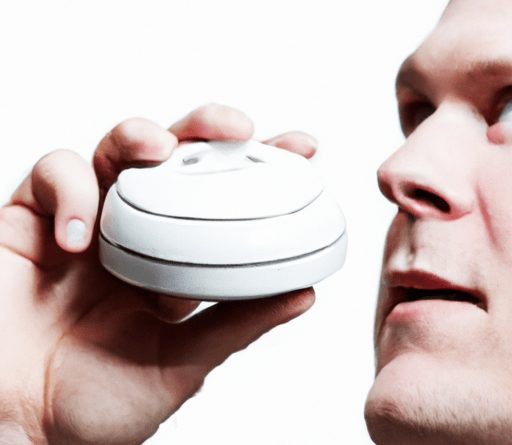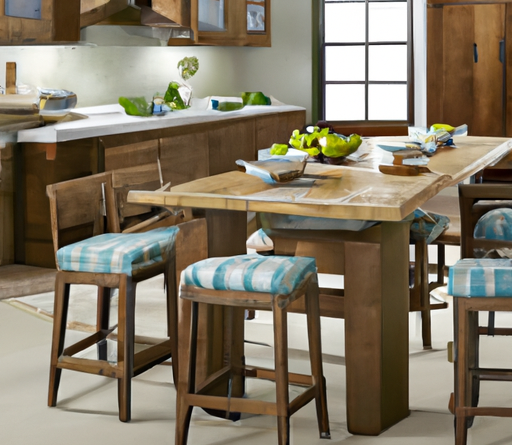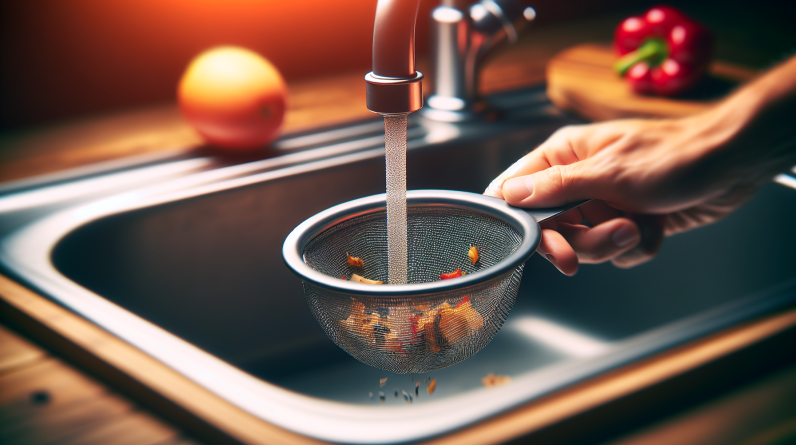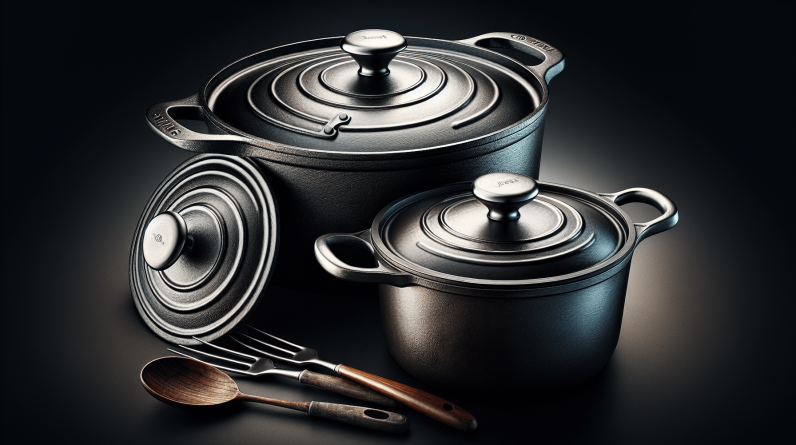When it comes to keeping our kitchen counters clean and germ-free, we often find ourselves questioning the most effective sanitation method. After all, in a space where we prepare our meals and handle food, ensuring a hygienic environment is essential. In this article, we will explore various techniques and products that can help us maintain squeaky clean kitchen counters. Say goodbye to uncertainty and hello to a spotless and safe cooking area!

Understanding Kitchen Counters
Kitchen counters are an essential component of any kitchen. They provide a workspace for meal preparation, a place to set down hot pots and pans, and a platform for showcasing decorative pieces. With the constant use they receive, it is crucial to understand how to effectively sanitize kitchen counters to ensure a clean and safe cooking environment. In this article, we will explore the different types of kitchen counters, the common contaminants that can be found on them, the importance of sanitization, and the various methods available to keep them clean and germ-free.
Different types of kitchen counters
Kitchen counters come in a variety of materials, each with its own unique properties and characteristics. The most common types of kitchen counters include granite, quartz, laminate, solid surface, marble, and stainless steel. Understanding the type of counter you have is important when choosing the right sanitizing method, as certain materials may have specific requirements or restrictions.
Granite counters are a popular choice due to their durability and natural beauty. Quartz counters, on the other hand, are engineered stone surfaces that offer a wider range of patterns and colors. Laminate counters are affordable and come in a multitude of designs, making them a versatile option. Solid surface counters, such as Corian, offer a seamless and non-porous surface that is resistant to stains and scratches. Marble counters provide an elegant and timeless look, but they require more maintenance. Lastly, stainless steel counters are known for their antibacterial properties and are commonly found in commercial kitchens.
Importance of sanitizing kitchen counters
Sanitizing kitchen counters is essential for maintaining a clean and healthy kitchen environment. Countertops can easily become breeding grounds for harmful bacteria, viruses, mold, and mildew. These contaminants can pose significant health risks if ingested or come into contact with food. Additionally, food residue and grease can accumulate on kitchen counters, attracting pests and causing unsightly stains.
Regularly sanitizing kitchen counters helps to eliminate these contaminants, reduce the spread of illness-causing pathogens, and prevent the growth of molds and mildew. By implementing proper sanitizing practices, you can create a safe and hygienic space for food preparation, ensuring the well-being of you and your loved ones.
Common Kitchen Contaminants
When it comes to kitchen counters, there are several common contaminants that can be present. Being aware of these contaminants is important in understanding the potential risks and knowing what to look out for when sanitizing your countertops.
Bacteria
One of the most common contaminants found on kitchen counters is bacteria. Bacteria can be introduced through raw meats, unwashed produce, or even by touching contaminated surfaces. Some of the common bacteria that can be found on kitchen counters include Salmonella, E. coli, and Staphylococcus aureus. These bacteria can cause foodborne illnesses if ingested and can multiply rapidly if not properly sanitized.
Viruses
Viruses are another type of contaminant that can be found on kitchen counters. They can be introduced through contact with an infected person, contaminated surfaces, or unwashed hands. Viruses such as Norovirus and Hepatitis A can survive on surfaces for extended periods and can cause illnesses when ingested.
Mold and Mildew
Mold and mildew are types of fungi that can thrive in warm and moist environments, making kitchen counters susceptible to their growth. These contaminants are not only unsightly but can also trigger allergies and respiratory problems in sensitive individuals. Mold and mildew can develop if kitchen counters are not properly dried after use or if there is excessive humidity in the kitchen.
Food Residue and Grease
Food residue and grease can accumulate on kitchen counters, especially after cooking. While they may not be as harmful as bacteria or viruses, they can attract pests such as ants and flies. Additionally, they can stain the countertop surface and create an unappealing appearance. Removing food residue and grease is an essential part of sanitizing kitchen counters.

Choosing the Right Sanitizing Method
With the various types of kitchen counters and contaminants, it is important to choose the right sanitizing method to ensure effective cleaning. Factors such as the type of countertop material, environmental considerations, and the effectiveness against specific contaminants should be taken into account.
Consider the type of countertop material
Different countertop materials have different cleaning requirements. Some materials, such as granite and quartz, are more resistant to harsh chemicals and abrasive cleaners, while others, like marble, may be more sensitive. It is important to refer to the manufacturer’s guidelines or consult with a professional to determine the best sanitizing method for your specific countertop material.
Environmental considerations
If you prefer to use natural and eco-friendly cleaning methods, there are several options available. Natural remedies such as vinegar, lemon juice, and tea tree oil can be effective in sanitizing kitchen counters while minimizing the use of harsh chemicals. However, it is important to note that natural remedies may not be as potent as commercial cleaners and may require additional steps or repetition to achieve the same level of sanitation.
Effectiveness against specific contaminants
Different sanitizing methods may be more effective against certain contaminants. For example, bleach-based sanitizers are known for their effectiveness against bacteria and viruses, while hydrogen peroxide-based sanitizers are effective against mold and mildew. Understanding the specific contaminants you are targeting can help guide your choice of sanitizing method.
Sanitizing Kitchen Counters with Natural Remedies
For those who prefer natural and eco-friendly cleaning solutions, there are several options available for sanitizing kitchen counters.
Vinegar and Water Solution
A vinegar and water solution is a popular natural remedy for cleaning and sanitizing kitchen counters. Mix equal parts of white vinegar and water in a spray bottle and spray the solution onto the countertop. Allow it to sit for a few minutes before wiping it off with a clean cloth or sponge. Vinegar has natural antibacterial properties and can help remove stains and odors from the countertop surface.
Lemon Juice and Baking Soda Paste
Lemon juice and baking soda can be combined to create a powerful cleaning paste. Mix lemon juice and baking soda to form a paste-like consistency and apply it to the countertop. Gently scrub the surface using a soft cloth or sponge and rinse with water. Lemon juice acts as a natural disinfectant and can help remove stubborn stains, while baking soda acts as a gentle abrasive cleaner.
Hydrogen Peroxide
Hydrogen peroxide is another natural remedy that can effectively sanitize kitchen counters. Simply pour hydrogen peroxide directly onto the countertop and let it sit for a few minutes. Wipe it off with a clean cloth or sponge and rinse with water. Hydrogen peroxide has antibacterial and antifungal properties, making it a suitable option for combating mold and mildew.
Tea Tree Oil Solution
Tea tree oil is a natural antiseptic that can be used to sanitize kitchen counters. Dilute a few drops of tea tree oil in water and spray the solution onto the countertop. Allow it to sit for a few minutes before wiping it off with a clean cloth or sponge. Tea tree oil is known for its antimicrobial properties and can help inhibit the growth of bacteria and fungi.

Sanitizing Kitchen Counters with Commercial Cleaners
Commercial cleaners offer a wide range of options for sanitizing kitchen counters. These products are specifically formulated to effectively eliminate contaminants and provide a convenient and efficient cleaning solution.
Bleach-based sanitizers
Bleach-based sanitizers are commonly used in commercial kitchens due to their effectiveness against bacteria and viruses. They can be purchased as ready-to-use sprays or concentrated solutions that require dilution. When using bleach-based sanitizers, it is important to follow the manufacturer’s instructions regarding dilution ratios and contact time. It is also crucial to ensure proper ventilation and avoid mixing bleach with other cleaning agents to prevent the release of toxic fumes.
Quaternary Ammonium Compounds (Quats)
Quaternary Ammonium Compounds, commonly known as Quats, are another type of commercial cleaner used for sanitizing kitchen counters. They are effective against a wide range of bacteria and viruses. Quats can be found in various forms such as wipes, sprays, and concentrated solutions. It is important to read the product labels and follow the instructions provided by the manufacturer for optimal results.
Alcohol-based sanitizers
Alcohol-based sanitizers are commonly used for quick and easy sanitation of kitchen counters. They are available in various forms, including wipes and sprays. Alcohol-based sanitizers are effective against bacteria and some viruses, but may not be as effective against certain types of mold and mildew. When using alcohol-based sanitizers, it is important to follow the recommended contact time for maximum efficacy.
Hydrogen Peroxide-based sanitizers
Hydrogen peroxide-based sanitizers offer an alternative to bleach-based sanitizers. They are effective against a wide range of bacteria, viruses, molds, and mildew. These sanitizers can be found in ready-to-use sprays or concentrated solutions that require dilution. Similar to other commercial cleaners, it is important to follow the manufacturer’s instructions for proper usage.
Proper Sanitizing Practices
Aside from choosing the right sanitizing method, it is important to follow proper sanitizing practices to ensure the effectiveness of the cleaning process.
Remove visible dirt and food particles
Before sanitizing, it is important to remove any visible dirt and food particles from the countertop surface. Use a soft brush or cloth to gently sweep away loose debris. This step helps to prevent the spread of contaminants and allows the sanitizing agent to come into direct contact with the surface.
Wash hands before sanitizing
Always wash your hands before sanitizing kitchen counters. This helps to prevent the transfer of bacteria and viruses from your hands to the countertop surface. Use warm water and soap, lathering your hands for at least 20 seconds, before rinsing thoroughly.
Use clean and lint-free cloths
When sanitizing kitchen counters, it is important to use clean and lint-free cloths or sponges. Dirty or contaminated cloths can reintroduce bacteria and other contaminants onto the countertop surface. Wash your cleaning cloths regularly to ensure they remain sanitary.
Follow contact time recommendations
Different sanitizing agents have specific contact time recommendations, which indicate how long they need to stay on the surface to effectively kill bacteria, viruses, mold, and mildew. It is important to follow these recommendations and allow the sanitizing agent to work for the specified duration to ensure optimal cleanliness.
Avoid cross-contamination
To prevent cross-contamination, it is important to avoid using the same cloth or sponge for cleaning different areas of the kitchen. Use separate cleaning tools for different surfaces, such as countertops, sinks, and cutting boards. This helps to prevent the spread of bacteria and other contaminants from one area to another.
Frequency of Sanitization
The frequency of sanitizing kitchen counters depends on several factors, including daily usage, food preparation practices, and the overall cleanliness of the kitchen. Here are some guidelines to help you determine how often you should sanitize your kitchen counters:
Daily sanitization routine
It is recommended to sanitize kitchen counters daily, especially in households with high food preparation activity. This helps to maintain a clean and hygienic environment and prevent the accumulation of harmful bacteria and other contaminants.
Sanitizing after preparing raw meat, poultry, or seafood
After handling raw meat, poultry, or seafood, it is essential to sanitize the kitchen counters to minimize the risk of cross-contamination. These raw ingredients can contain harmful bacteria that can spread to other surfaces and contaminate other foods. Sanitizing immediately after handling these items helps to prevent the potential spread of illness-causing pathogens.
Sanitizing after handling potentially contaminated items
If you suspect that an item or surface may be contaminated, such as a spill or a cutting board used for raw meat, it is important to sanitize the kitchen counters promptly. This helps to prevent the spread of bacteria or other contaminants to other areas of the kitchen.
Additional Tips for Maintaining Sanitary Kitchen Counters
In addition to regular sanitization, there are several tips you can follow to help maintain sanitary kitchen counters:
Regularly deep clean countertops
While daily sanitization is important, it is also recommended to periodically deep clean kitchen counters. This involves a more thorough cleaning, including the removal of appliances and objects from the countertop surface to reach hidden areas. Deep cleaning helps to remove any accumulated dirt, grease, or stains, ensuring a thorough and complete sanitization.
Avoid leaving wet items on the counter
Leaving wet items, such as wet sponges or dishcloths, on the kitchen counter can create a moist environment that promotes the growth of bacteria and mold. Ensure that all wet items are properly dried and stored to minimize the risk of contamination.
Utilize cutting boards and food-safe containers
To prevent direct contact between food and the countertop surface, it is recommended to use cutting boards and food-safe containers. Cutting boards should be washed and sanitized after each use to prevent bacterial growth. Food-safe containers should be used to store perishable items and prevent any potential leakage or spills onto the countertop.
Properly store cleaning materials
Properly storing cleaning materials, such as sanitizing solutions, cloths, and sponges, is essential for maintaining a sanitary kitchen. Keep these items away from food preparation areas and ensure they are stored in a clean and dry environment to prevent the growth of bacteria or mold.
Conclusion
Sanitizing kitchen counters is an essential aspect of maintaining a clean and safe cooking environment. Understanding the different types of kitchen counters, the common contaminants that can be found on them, and the importance of proper sanitization is crucial for ensuring the health and well-being of you and your loved ones. By choosing the right sanitizing method, following proper sanitizing practices, and adopting additional tips for maintaining sanitary kitchen counters, you can create a welcoming and hygienic space for all your culinary adventures. Remember, a clean kitchen is a happy kitchen!










